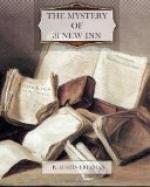“Oh, John knew that, did he?”
“Yes, he certainly did; for it came out in the evidence that he had called on Jeffrey at his chambers more than once. There is no denying that. But, mark you!” Mr. Marchmont added emphatically, “that does not cover the inconsistency of the will. There is nothing in the second will to suggest that Jeffrey intended materially to increase the bequest to his brother.”
“I quite agree with you, Marchmont. I think that is a perfectly sound position. You have, I suppose, fully considered the question as to whether it would be possible to set aside the second will on the ground that it fails to carry out the evident wishes and intentions of the testator?”
“Yes. My partner, Winwood, and I went into that question very carefully, and we also took counsel’s opinion—Sir Horace Barnaby—and he was of the same opinion as ourselves; that the court would certainly uphold the will.”
“I think that would be my own view,” said Thorndyke, “especially after what you have told me. Do I understand that John Blackmore was the only person who knew that Jeffrey was in residence at New Inn?”
“The only one of his private friends. His bankers knew and so did the officials from whom he drew his pension.”
“Of course he would have to notify his bankers of his change of address.”
“Yes, of course. And a propos of the bank, I may mention that the manager tells me that, of late, they had noticed a slight change in the character of Jeffrey’s signature—I think you will see the reason of the change when you hear the rest of his story. It was very trifling; not more than commonly occurs when a man begins to grow old, especially if there is some failure of eyesight.”
“Was Mr. Jeffrey’s eyesight failing?” asked Thorndyke.
“Yes, it was, undoubtedly,” said Stephen. “He was practically blind in one eye and, in the very last letter that I ever had from him, he mentioned that there were signs of commencing cataract in the other.”
“You spoke of his pension. He continued to draw that regularly?”
“Yes; he drew his allowance every month, or rather, his bankers drew it for him. They had been accustomed to do so when he was abroad, and the authorities seem to have allowed the practice to continue.”
Thorndyke reflected a while, running his eye over the notes on the slips of paper in his hand, and Marchmont surveyed him with a malicious smile. Presently the latter remarked:
“Methinks the learned counsel is floored.”
Thorndyke laughed. “It seems to me,” he retorted, “that your proceedings are rather like those of the amiable individual who offered the bear a flint pebble, that he might crack it and extract the kernel. Your confounded will seems to offer no soft spot on which one could commence an attack. But we won’t give up. We seem to have sucked the will dry. Let us now have a few facts respecting the parties concerned in it; and, as Jeffrey is the central figure, let us begin with him and the tragedy at New Inn that formed the starting-point of all this trouble.”




